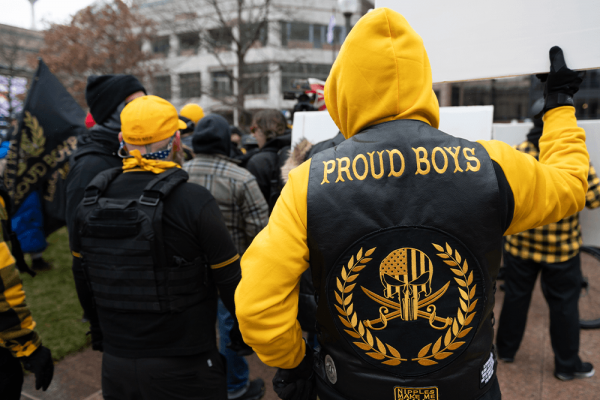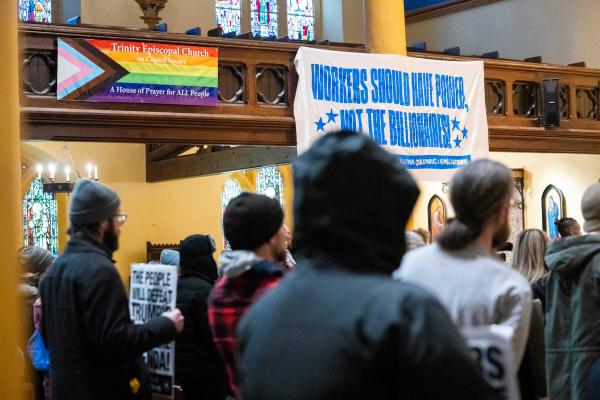Seven or eight years ago, at a pastor’s conference, I received Bill Hybels’ book Courageous Leadership. It was one of the go-to books to read as I entered the next phase of my vocational ministry.
Hybels, the successful megachurch pastor and ministry entrepreneur, had it all — Willow Creek, the perennially growing religious empire planted amongst the McMansions of suburban Chicago where it (and he) had access to the world’s most powerful and most famous.
It was without apparent irony that Hybels’ author photos on the dust jacket of Courageous Leadership pictured him at the helm of his yacht — a man who was perhaps unable to walk on water, but capable of traversing its depths in style and luxury.
Reflecting on his experience as a spiritual leader, in the book, Hybels writes, “Leaders should never apologize for the strength of feeling that accompanies their God-given visions. God designed leaders to experience their longing, their desire, and their drive deeply, and to express it fully. And when they do, they energize others.”
That leadership tidbit now reeks with the all-too-common toxic masculinity that defines our age, as one generation stumbles out of power and leaves the rest of us to clean up its mess.
Sunday morning, as I prepared reflections on evil, resistance, and resilience for my evening sermon, a new, breathtaking account of Hybels’ sexual and spiritual abuse of a church employee (his administrative assistant who for a time lived in his home with his wife and children) greeted me in the pages of the New York Times.
The evangelical world in which I came of age was created in Bill Hybels' image. Nearly singular in his influence and power, Hybels was one of a handful of Baby Boomer church innovators who reimagined church to be “seeker sensitive,” designed for the spiritually curious who also might be searching for the convenience of a food court, parking lot, and sermons on tape that were ready for purchase in the lobby by the time the worship band sang the final chorus of the recessional.
For 40-some years, Hybels reigned supreme from his Chicagoland pulpit, eschewing a previous generation’s stuffier rules and denominational affiliations in an effort to make the story and promises of Jesus more accessible.
To be honest, I always was a bit skeptical of Hybels. While attending seminary a few dozen miles south of Willow Creek, in the actual city of Chicago, I began to learn about class and ecology matters, and grew a bit perplexed as to why white evangelicals from the city and suburbs were willing to drive more than an hour (each way) to attend his church events on the weekends and Wednesday nights.
I recall attending a service at Willow Creek where one of its associate pastor bragged that the flagship congregation had members from as far away as Indiana and Wisconsin. As a seminarian thinking about fossil fuels for a creation care and environmentalism term paper, the irony of thousands of gas-guzzling vehicles driving long distances every week ostensibly to come worship and learn about the God of Creation rubbed me the wrong way.
I figured my beef with Hybels was, perhaps, more generational than theological —like the kind of debate you might get into with your friend’s parents at the kitchen counter. After all, Hybels was ahead of the curve in mentoring the generation behind him, hiring women for top roles in church work, and shedding light on racism and global poverty.
Sure, occasionally I’d hear stories that would make me kind of cock my head, such as how Hybels would fly down to meet with his African-American pastoral colleagues 25 miles away on the southside of Chicago (a drive that might take 90 minutes in traffic), or when he would call in from his vacation home to heap criticism on the pastors beneath him for their work on Sunday morning (which he had studiously observed through a special remote video feed).
But as Laurie Goodstein’s story in the weekend's Times and Manya Brachear Pashman’s follow-up report in the Chicago Tribune have proved, my unease with and concerns about Hybels were not benign generational divides, rather they were symptoms of a massive, gaping wound of betrayal.
Through the intrepid, cautious, and fair reporting by the two veteran religion journalists, Brachear Pashman (who broke the first #MeToo investigative report about Hybels earlier this for the Tribune) and Goodstein in Times, we see a portrait of a leader who for years serially abused, shamed, and lied about his sexual, emotional, and spiritual mistreatment of women in his role as pastor of Willow Creek.
In Hybels wake lies a wreckage of human lives — from his victims and congregants, to his family, colleagues, and the subordinates whom he additionally shamed and forced out of ministry for offenses comparable to the ones he had committed.
In October 2016, I remember wondering why leaders such as Bill Hybels didn’t speak out when the infamous Access Hollywood tape leaked of Donald Trump bragging about how he had grabbed women by their genitals and forced himself on them. It certainly seems likely that Hybels didn’t speak up because he was guilty of the same kind of repellant behavior himself.
Now I can’t shake the feeling that the Christian household I have inherited is built on a broken foundation of lies, abuse, and the misuse of power.
Hybels may have stepped aside months before his scheduled retirement party, but that’s not enough. All of his denials and equivocating and minimizing, and the maligning of his victims and accusers and the media reporting on his misdeeds needs to stop. We are in the grace and reconciliation business. And he needs to repent.
We also need his fellow Boomer brothers in ministry, men such as Bob Goff (who wrapped Hybels in a bear hug and led a standing ovation during the Willow Creek “family meeting” back in March where Hybels called the accusations against him “flat-out lies”) and others, who have enabled or papered over Hybels’ offenses to pull a 180. They all need to come tell the truth — the whole truth — about the rampant culture of abusive power in our churches, or they need to step aside.
It might be too late already — across the nation, people rightly are emptying the pews of churches big and small; we’re headed for a new season of gathered local community. And the communities we’re co-creating with those courageous enough to do so, will be built together, with truth and equality, humility, and vulnerability.
Got something to say about what you're reading? We value your feedback!







